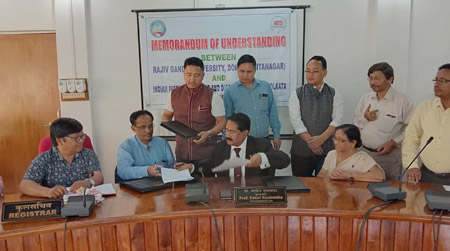RONO HILLS, Apr 19: Rajiv Gandhi University here on Friday signed a memorandum of understanding (MoU) with Kolkata-based Indian Institute of Liver & Digestive Sciences (IILDS) on cooperation and implementation of a community-based project on delivery of comprehensive hepatitis B virus (HBV) care in Arunachal Pradesh.
The project is funded by the John C Martin Foundation, USA, with the IILDS as the primary recipient of the grant and RGU as the sub-recipient.
RGU was represented by its Vice Chancellor Prof Saket Kushwaha, Registrar Prof Tomo Riba and the university’s executive council member Dr Akin Tana Tara, while the IILDS was represented by the secretary of its board of governance, Prof Abhijit Chowdhury.
Congratulating both the institutions, Prof Kushwaha said the MoU was an indicator of the larger role that a university needs to play in addition to providing access to higher education and research.
“Universities must engage with civil society and constantly explore ways of how it can contribute to the state’s wellbeing. Academic work is one component of what we do.
This, the outreach and finding synergies with the people, is another significant component that RGU has always striven to deliver,” he said.
As part of the project, the institutions will collectively build rural community outreach and viral hepatitis clinical testing capabilities, consolidate viral hepatitis disease characterization and research capabilities, and sample general populations in Arunachal to understand HBV prevalence and characteristics, while linking participants to care, including vaccination, monitoring and treatment, the university informed in a release.
Designed with a duration of 10 months, the Rs 60-lakh project would target a population of 3000 people of all ages and both sexes residing in the state, and build the capacity of doctors and nurses in terms of disease states, prevention, care and treatment of hepatitis B, in addition to training laboratory workers to conduct clinical tests for hepatitis infection, diagnosis and monitoring, it said.
The project would also involve conducting screening for hepatitis B and hepatitis C to identify those currently infected, previously exposed, immunized by vaccination, and at risk of infection.
After the results are analyzed and reported, individuals will be followed up according to the status of the screening results. Those with chronic infection will be referred to infectious disease or liver specialists. Vaccination will be offered to those who are at risk, and vaccination of infants will be conducted, starting with birth dose, according to WHO guidelines, the release said.



